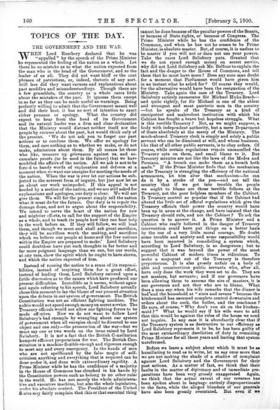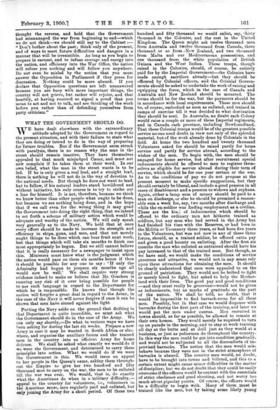TOPICS OF THE DAY.
THE GOVERNMENT AND THE WAR.
WHEN Lord Rosebery declared that he was "appalled" by the speech of the Prime Minister he represented the feeling of the nation as a whole. Let there be no mistake as to what the nation expected from the man who is the head of the Government, and so the leader of us all. They did not want bluff or the cant phrases of patriotism, or, indeed, rhetoric of any sort. Still less did they want excuses and explanations about past muddles and misunderstandings. Though there are a few grumbleis, the country as a whole cares little about the mistakes of the past. It ignores them except in as far as they can be made useful as warnings. Being perfectly willing to admit that the Government meant well and did their best, it has no sort of intention to exact either penance or apology. What the country did expect to bear from the head of its Government and its natural leader was a firm and clear declaration that the Ministry would distract neither itself nor the people by excuses about the past, bat would think only of the present. We do not ask you to forget our past actions or to condone them. We offer no apology for them, and care nothing as to whether we make, or do not make, admissions about them. By all means let those who like, treasure up grievances against us, and ac- cumulate proofs (to be used in the future) that we have muddled the affairs of the nation. All we ask is not to be forced to bandy words of explanation and defence at a moment when we want our energies for meeting the needs of the nation. When the war is over let our actions be sub- jected to the severest form of inquiry, but just now let us go about our work unimpeded. If this appeal is not heeded by a section of the nation, and we are still asked for explanations and apologies, our duty is clear. We will not give them. We will for the present simply tell the nation what it must do for the future. Our duty is to repair the damage done, and not to argue about the responsibility. We intend to nerve the heart of the nation for new and mightier efforts, to call for the support of the Empire as a whole, and to teach its people how they can best help in the work before us. If they will follow, we will lead them, and though we must and shall ask great sacrifices, they will be sacrifices worth the making, and sacrifices which we believe our people at home and the free nations within the Empire are prepared to make.' Lord Salisbury could doubtless have put such thoughts in far better and far more poignant language than we can, but our words, at any rate, show the spirit which he ought to have shown, and which the nation expected of him.
Instead of rousing the nation to a sense of its responsi- bilities, instead of inspiring them for a great effort, instead of leading them, Lord Salisbury entered upon a futile discussion as to the causes which have produced our present difficulties. Incredible as it seems, without again and again referring to his speech, Lord Salisbury actually chose this moment to lay the blame of our present situation upon the defects in our system of government. The British Constitution was not an efficient fighting machine. The public would not spend enough money on secret service. The Treasury officials would not allow our fighting forces to be made effective. Now we do not want to follow Lord Salisbury's bad example by wrangling about our system of government when all energies should be directed to one object and one only—the prosecution of the war—but we must say one or two words on the issue raised by Lord Salisbury. It is not a fact that the British Constitution hampers efficient preparations for war. The British Con. stitution is a machine flexible enough and vigorous enough to meet any and every emergency. In the hands of men who are not spellbound by the false magic of self- criticism anything and everything that is required can be done under it, and done with extraordinary rapidity. A Prime Minister while he has the confidence of a majority in the House of Commons has clenched in his hands by the Constitution powers such as belong to no other ruler in the world. He has not merely the whole administra- tive and executive machine, but also the whale legislative, under his absolute control. The President of the United Sates may fairly complain that this or that essential thing cannot be done because of the peculiar powers of the Senate, or because of State rights, or because of Congress. The Prime Minister while he has the confidence of the Commons, and when he has not he ceases to be Prime Minister, is absolute master. But, of course, it is useless to be master if you will not or dare not use your powers. Take the cases Lord Salisbury puts. Granted that we do not spend enough money on secret service, why did not Lord Salisbury ask Mr. Balfour to explain the fact and the danger to the House of Commons, and tell them that he must have more ? Does any sane man doubt for a moment that Parliament would have given him in an instant what he asked for ? Of course they would, for the alternative would have been the resignation of the Ministry. Take again the case of the Treasury. Lord Salisbury entirely exonerates Sir Michael Hicks-Beach- and quite rightly, for Sir Michael is one of the ablest and strongest and most patriotic men in the country —but he speaks of the Treasury as a kind of omnipotent and malevolent institution with which his Cabinet has fought a brave but hopeless struggle. What is this terrible Treasury ? Not, as we might suppose, a body with independent authority, but a mere Department of State absolutely at the mercy of the Ministry. The much-abused Treasury clerk is simply and solely a public servant who can be dismissed at will, and whose business, like that of all other public servants, is to obey orders. Of course, while certain regulations remain uncancelled the Treasury acts on them, and small blame to it. But Treasury minutes are not like the laws of the Medea and Persians. "A breath can make them as a breath hath made." If the Prime Minister finds that the mechanism of the Treasury is strangling the efficiency of the national armaments, let him alter that mechanism—he can do it by a stroke of the pen—and not tell the country that if we get into trouble the people we ought to blame are those terrible fellows at the Treasury, not the poor helpless members of the Cabinet. Is Treasury control so popular that if the Cabinet had altered the little set of official regulations which give the Treasury officials their power the country would have been up in arms at the change, and have insisted that the Treasury should rule, and not the Cabinet ? To ask the question is to answer it. A Prime Minister and a Cabinet who really believed in the danger of Treasury intervention could have put things on a better basis by the use of a very little moral courage. No doubt some trouble and anxiety and some responsibility would have been incurred in remodelling a system which, according to Lord Salisbury, is so dangerous ; but to suggest that it was beyond the power of the most powerful Cabinet of modern times is ridiculous. To make a scapegoat out of the Treasury is therefore preposterous. It is also grossly unfair on a body of able and conscientious public servants who, after all, have only done the work they were set to do. They are not masters, but servants ; and if our governors have been allowing them to assume the airs of masters, it is our governors and not they who are to blame. What does a man say. when his wife remarks that the dinner is bacra.nd the household at " sixes and sevens " because the kitchenmaid has assumed complete control downstairs and orders about the cook, the butler, and the coachman ? He says, of course, " Why don't you sit on the kitchen- maid ? " What he would say if his wife were to add that this would be against the rules of the house we need not inquire. In any case it is abundantly clear that if the Treasury system is as destructive to our efficiency as Lord Salisbury represents it to be, he has been guilty of the most extraordinary dereliction of duty in remaining Prime Minister for all these years and leaving that system unreformed.
Before we leave a subject about which it must be as humiliating to read as to write, let us say once more that we are not making the shade of a shadow of complaint against Lord Salisbury and the Government for their past actions. As a matter of fact, we think that their faults in the matter of diplomacy and of immediate pre. parations have been very grossly exaggerated. Again, we think that the actual extent of our reverses has been spoken about in language entirely disproportionate to the facts, while the alleged blunders of our generals have also been greatly overstated. But even if we
thought the reverse, and held that the Government had mismanaged the war from beginning to end—which we do not think—we should still say to the Cabinet :— "Don't bother about the past; think only of the present, and of ways to meet future difficulties and dangers in a manner that will be irresistible. As long as you begin to prepare in earnest, and to infuse courage and energy into the nation, and efficiency into the War Office, the nation will refuse you nothing and will follow you anywhere. Do not even be misled by the notion that you must answer the Opposition in Parliament if they press for discussion. Nothing could be more absurd. If you declare that Opposition questions are left unanswered because you are busy with more important things, the country will not grieve, but rather will rejoice, and that heartily, at having received so signal a proof that you mean to act and not to talk, and are thinking of the work before you rather than of defending yourselves from party criticism."







































 Previous page
Previous page